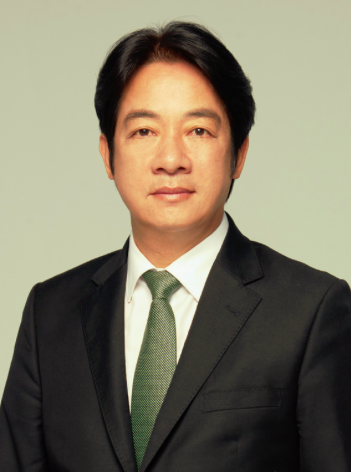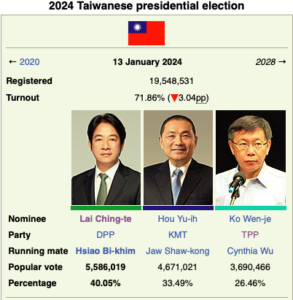
Dr. Lai Ching-te
Taipei/Washington/Beijing: After the victory of Dr. Lai Ching-te in Taiwan’s presidential election, China trained its guns on the United States, urging Washington to “stop interactions of an official nature with Taiwan and stop sending any wrong signal to the separatist forces for ‘Taiwan independence’, if the US truly hopes to safeguard peace and stability in the Taiwan Strait”.
Elections were held in the Taiwan region on January 13, 2024, and 40.05% of voters favoured 64-year-old Dr. Lai, the current Vice President from the ruling Democratic Progressive Party (DPP), who in the run-up to the elections accused China of resorting to all means to interfere with the election. He strongly opposes any unification with mainland China, and soon after his election, posted on X, “Today, #Taiwan has once again shown the world our people’s commitment to democracy”.

Dr. Lai’s victory meant that for the first time, a political party won more than two consecutive presidential elections since direct elections were introduced in 1996 in Taiwan. His inauguration will be on May 20, 2024. (The presidential election saw a 71.86% turnout and this was the first time since the 2000 election that the winning candidate obtained less than 50% of the vote).
China’s Taiwan Affairs Office specifically mentioned Dr. Lai posed a “severe danger” to cross-Strait ties while urging voters in Taiwan to make the “correct choice”. Reports suggested that the KMT’s Hou Yu-ih was Beijing’s preferred candidate. China, however, maintained that regardless of the election result, “it will not change the basic fact that Taiwan is part of China and there is only one China in the world”. Chinese foreign ministry spokesperson Mao Ning asserted: “The elections of the Taiwan region are China’s internal affairs.”
There was much drama that unfolded in the run-up to the elections. First, Taiwanese officials claimed that three Chinese balloons were detected flying over the Taiwan Strait on January 7, 2024, which threatened aviation safety. Thereafter, China’s successful launch of the Einstein probe satellite on January 9, 2024, too triggered Taiwan authorities to issue an emergency alert, which caused quite a lot of concerns among the public in Taiwan.
On the eve of the elections in Taiwan, the US Congress too had moved resolutions, much appreciated by Taiwan, to show its strong support and high regard for Taiwan’s freedom and democracy. The resolutions stressed that the US would strongly support the Taiwan-US partnership regardless of the outcome of Taiwan’s elections, expressed concern over China’s attempts to interfere with said elections and declared US support for Taiwan’s defence and liberal democracy. The resolution stressed that the United States and Taiwan stood as partners against coercion, threats of war, and armed attacks from China, and that Washington was committed to supporting Taiwan’s self-defence and the liberty of its people through effective deterrence using all elements of United States power.
Upon his election as President yesterday, the US State Department stated it looked forward to working with Dr. Lai and Taiwan’s leaders of all parties “to advance our shared interests and values, and to further our longstanding unofficial relationship, consistent with the US one-China policy as guided by the Taiwan Relations Act, the three Joint Communiques, and the Six Assurances”.
China today hit back and deplored the statement claiming it “seriously violates the one-China principle and the three China-US joint communiqués, and goes against the US’ own political commitment to maintaining only cultural, commercial, and other unofficial relations with the people of Taiwan”. It asked the US to support China’s “peaceful reunification”.
Predictably, the US congratulated the Taiwan electorates for demonstrating the strength of their “robust democratic system and electoral process”, and stated that its partnership with Taiwanese people, rooted in “democratic values, continues to broaden and deepen across economic, cultural, and people-to-people ties”. It asserted that it was committed to maintaining Cross-Strait peace and stability, and the peaceful resolution of differences, “free from coercion and pressure”.
This prompted Beijing to accuse Washington of sending a “gravely wrong signal to the “Taiwan independence” separatist forces”. It said it “firmly” opposed the US having any form of official interaction with Taiwan and interfering in Taiwan affairs in any way or under any pretext. “We urge the US to earnestly abide by the one-China principle and the three China-US joint communiqués and act seriously in accordance with the commitments that have been reaffirmed multiple times by the US leaders to not supporting “Taiwan independence”, “two Chinas” or “one China, one Taiwan”, and not seeking to use the Taiwan question as a tool to contain China,” a Chinese foreign ministry spokesperson said in Beijing today. The Spokesperson disclosed that China has made “serious representations” to the US side in this regard.
Incidentally, on January 12, 2024, during his meeting with the Chinese Minister of the International Liaison Department Liu Jianchao in Washington, D.C., the US Secretary of State Antony J. Blinken reiterated the importance of maintaining peace and stability across the Taiwan Strait and in the South China Sea.
Meanwhile, the President-elect Dr. Lai Ching-te, a physician, worked on the front lines to consolidate Taiwan’s democratic system. In 2019, he campaigned for the DPP candidates island-wide and defended Taiwan’s democracy, helping President Tsai Ing-wen win re-election and the DPP retain a legislative majority. Tsai was ineligible for reelection due to term limits this time.
– global bihari bureau





